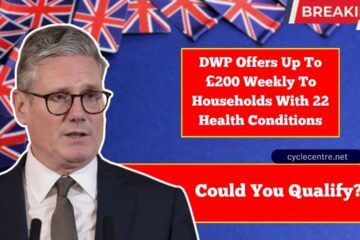The Department for Work and Pensions (DWP) has confirmed that not every state pensioner will qualify for the £300 Winter Fuel Payment this year.
While this payment is designed to help older people with rising heating bills, several groups will be excluded under new rules.
This decision has raised concerns among pensioners who rely on additional support during the colder months.
Below, we explain the eligibility criteria, who will miss out, and what the government has said about the changes.
What Are Winter Fuel Payments?
The Winter Fuel Payment is a financial boost given to pensioners each winter to help cover heating costs.
For 2025, eligible pensioners can receive up to £300, depending on their circumstances.
It is paid automatically to those who meet the criteria, but the DWP has made it clear that certain groups will not be included.
Who Will Not Receive the £300 Payment?
The DWP has outlined five key groups of pensioners who will be denied the Winter Fuel Payment in 2025:
Pensioners Living Outside England and Wales
If you live outside of England and Wales, you will not be eligible for the payment. The rules restrict this benefit to residents within these two regions.
Hospital Patients
Anyone who spends the entire week of 15 to 21 September 2025 in hospital receiving free treatment, as well as the same week in the previous year, will not receive the £300 payment.
Individuals Requiring Permission to Enter the UK
If your immigration status requires you to have permission to enter the UK, and your leave to remain specifically states that you cannot access public funds, you will not qualify.
Prisoners
If you are serving a prison sentence for the whole week of 15 to 21 September 2025, you are excluded from receiving the payment.
Other Restricted Categories
The DWP also applies restrictions to specific categories where eligibility conditions are not met, primarily relating to residency and public fund access.
Why Has the Government Made These Changes?
According to Torsten Bell, a Labour Party minister, the government’s aim is to ensure the Winter Fuel Payment is more targeted and fair.
Previously, this payment was almost universal, going to most pensioners regardless of income.
However, the updated policy now introduces an income threshold to better focus on those in real need.
The New Income Threshold – £35,000
Under the revised rules, pensioners with an annual income of up to £35,000 will qualify for the Winter Fuel Payment.
This threshold has been introduced to make sure that:
- Support goes to low and middle-income pensioners.
- Payments are distributed more fairly compared to previous universal criteria.
- Taxpayers’ money is spent responsibly, targeting those who need help most.
Torsten Bell explained that the £35,000 income limit is broadly in line with average annual earnings in the UK.
He noted that this adjustment means the vast majority of pensioners – around 9 million individuals – will still benefit.
How Is This Different From Previous Years?
In the past, eligibility was linked to whether pensioners received Pension Credit. This meant many missed out, despite still struggling with energy bills.
By raising the threshold to £35,000, more pensioners are included than under the previous system, but fewer than under the old near-universal arrangement.
The government argues this strikes a balance between helping the majority and maintaining fiscal responsibility.
Why Winter Fuel Payments Matter
The cost of energy remains a major concern for pensioners across the UK.
With rising heating bills, many elderly people are at risk of fuel poverty, particularly during harsh winters.
The Winter Fuel Payment is not just a financial benefit—it is seen as a lifeline that helps older citizens maintain a safe and warm home environment.
Restricting the payment means those outside the eligibility rules will need to find other sources of support.
Eligibility and Exclusion Rules for Winter Fuel Payment 2025
| Category | Eligible / Not Eligible | Notes |
|---|---|---|
| Resident of England & Wales | Eligible | Must live within these regions |
| Lives outside England & Wales | Not Eligible | Payment restricted to England and Wales only |
| In hospital 15–21 Sept (full week) | Not Eligible | Applies for 2025 and same week in previous year |
| Prisoners (15–21 Sept 2025) | Not Eligible | Full week imprisonment excludes eligibility |
| Income up to £35,000 | Eligible | New threshold allows majority of pensioners to qualify |
| Immigration restrictions (no funds) | Not Eligible | If leave to remain prohibits access to public funds |
What This Means for Pensioners
While millions will still benefit, those who fall into the excluded categories will miss out on essential help.
For low-income pensioners within England and Wales, this payment continues to provide crucial relief during the colder months.
The decision to tighten eligibility has been positioned as a “responsible use of taxpayers’ money”, ensuring that support is concentrated on those most likely to struggle with winter energy bills.
The DWP’s decision to deny £300 Winter Fuel Payments to five groups of pensioners marks a significant change in how this support is distributed.
By setting a clear £35,000 income threshold, the government hopes to strike a balance between fairness and financial responsibility.
While many pensioners—around 9 million—will still benefit, those excluded will need to explore alternative assistance programs.
For most, however, this payment will continue to provide vital relief against rising energy costs, ensuring a warmer and safer winter.
Frequently Asked Questions
Pensioners living in England and Wales with an annual income of up to £35,000 are eligible, unless they fall into an excluded group such as prisoners or long-term hospital patients.
The government introduced the £35,000 threshold to better target the payment at those most in need, aligning support with average earnings.
No. The payment is only available to pensioners living in England and Wales. Those residing abroad or in other UK regions are excluded.



0 Comments